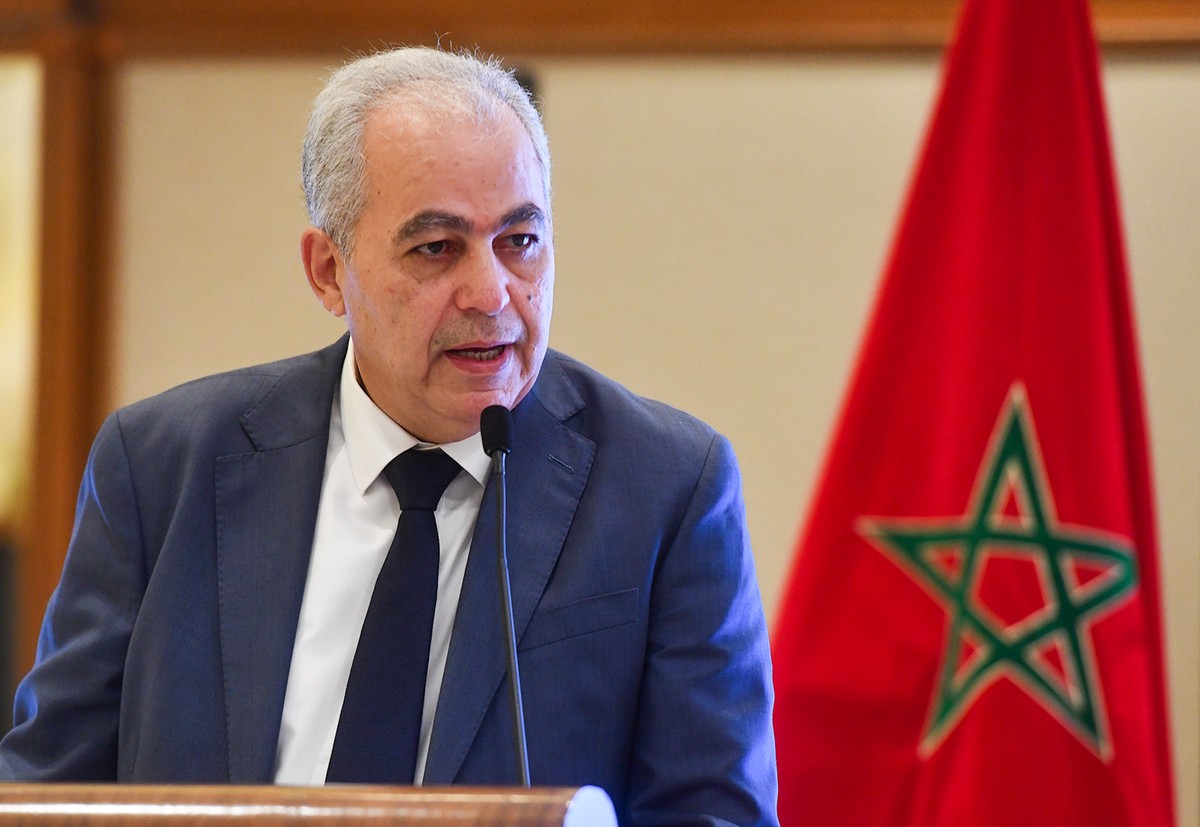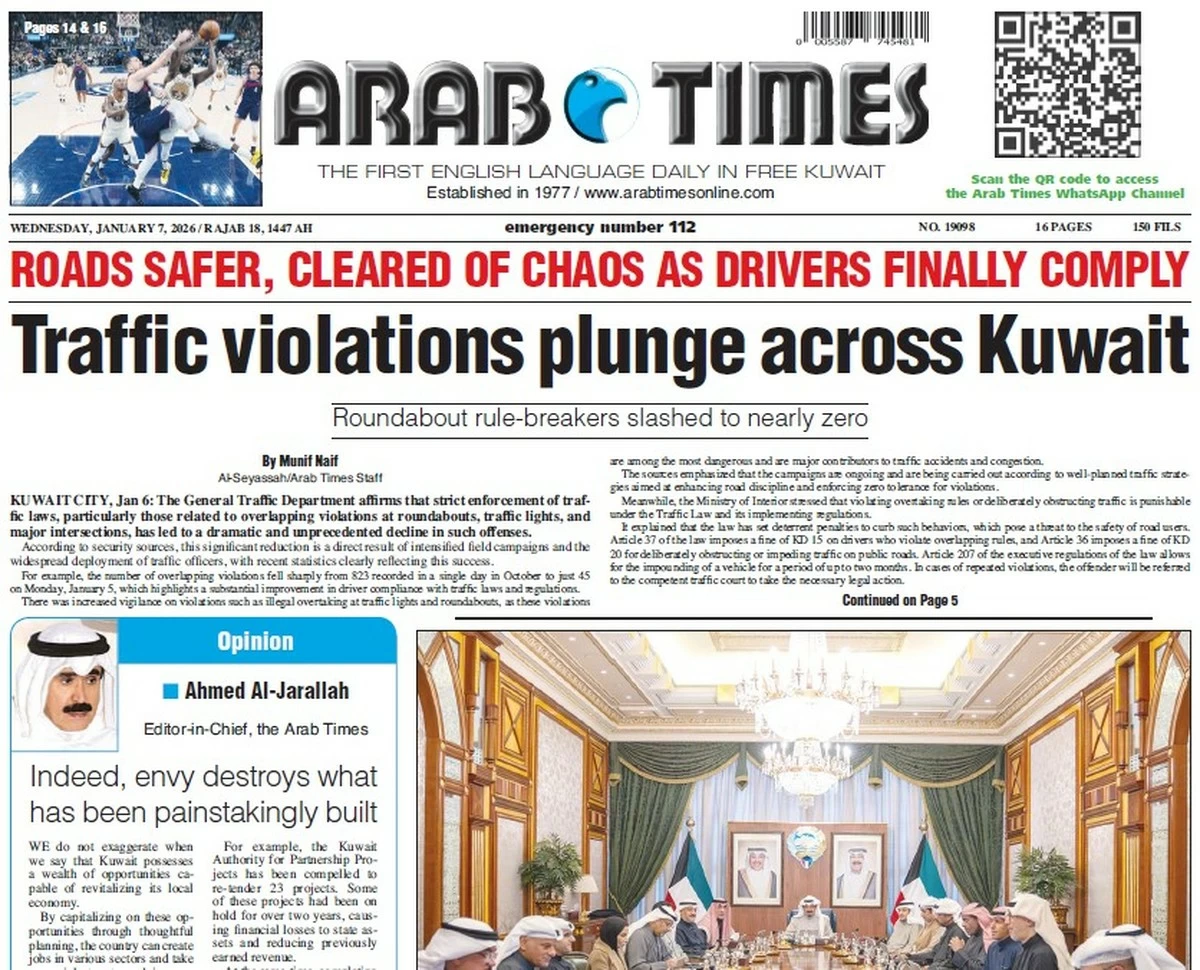13/11/2025
13/11/2025

Moroccan Ambassador to Kuwait Ali Ben Issa
KUWAIT CITY, Nov 13: Moroccan Ambassador to Kuwait Ali Ibn Issa affirmed that the anniversary of the Green March is a timeless national milestone embodying the highest ideals of unity and cohesion between the throne and the Moroccan people.
In an interview with the newspaper, Ibn Issa said the Moroccan- Kuwaiti relations serve as a distinguished model of Arab brotherhood and sincere cooperation between two countries bound by deep-rooted historical ties.
He confirmed that these relations are witnessing continuous development in various fields, thanks to the shared vision of the two countries’ leaderships. He also affirmed that all facilities are available for Kuwaitis visiting Morocco. He revealed Kuwaiti citizens are exempt from visa requirements for entry into Morocco, while Kuwait Airways launched a direct route to Casablanca in June 2022, currently operating three flights per week. He added the Moroccan community in Kuwait numbers over 6,000 distributed in different professions and sectors, including highly skilled professionals in several fields.
“The embassy provides them with a range of consular services. Administrative procedures have been simplified, and an electronic appointment system has been implemented to reduce waiting times and facilitate services,” he explained.
Following is an excerpt of the interview:
Question: What is the significance of the Green March for the Moroccan people? How does this anniversary reflect the spirit of solidarity and national unity?
Answer: Every year on Nov 6, the Moroccan people commemorate the triumphant Green March with feelings of pride and honor. It is an enduring national occasion that embodies the highest ideals of unity between the throne and the people. In 1975, more than 350,000 volunteers from all walks of life and regions of the Kingdom responded to the call of the late King Hassan II (may Allah have mercy on him) to participate in this historic and peaceful march, which exemplified a unique lesson in peaceful struggle and national commitment. For the new generations, this anniversary serves as a renewed symbol of the collective will to continue the journey of building and development in the southern provinces, through the vision of King Mohammed VI, who made the Moroccan Sahara a driving force for integrated development and a cornerstone of the new development model. In this context, Security Council Resolution 2797, adopted on Oct 31, 2025, reaffirmed the realism and credibility of the Moroccan autonomy initiative as the only just and lasting solution to the regional dispute over the Moroccan Sahara, supporting the exclusive efforts undertaken by Morocco under the auspices of the United Nations (UN).
Q: How would you describe the level of relations between Morocco and Kuwait today under the wise leadership of both countries?
A: The relations between the Kingdom of Morocco and Kuwait constitute a firm model of what Arab relations should be. It is built on genuine brotherhood, mutual respect and effective solidarity. These relations have become even more firmly established and profound under the wise leadership of King Mohammed VI and his brother, His Highness Sheikh Meshal Al-Ahmad Al-Jaber Al-Sabah, the Amir of the State of Kuwait. Both of them are keen on developing the ongoing consultation and coordination on various issues of mutual concern.
Q: What are the most important historical milestones that have contributed to consolidating these relations? What areas do you see as needing further development?
A: Morocco and Kuwait are bound by strong and enduring historical relations. This strong bond dates back to the early 1960s, exemplified by the historic visit of the late King Mohammed V to Kuwait in 1960, Morocco’s support for Kuwait’s membership in the League of Arab States, and the resolute stance of the late King Hassan II following the brutal invasion of Kuwait in 1990. We also recall with pride and gratitude the noble and unwavering support of Kuwait and its wise leadership for the territorial integrity of the Kingdom since the recovery of its southern provinces in 1975, following the launch of the Green March by the late King Hassan II.
Q: How do you view the role of the existing memoranda of understanding between the two countries? Are there any new agreements under negotiation that could be presented soon?
A: The legal framework governing bilateral cooperation between the two countries is rich and diverse. Morocco and Kuwait have signed several agreements, memoranda of understanding and executive programs. The first agreement signed between the two parties dates back to April 26, 1965, under which Kuwait granted a loan to Morocco to finance an agricultural project in Tassaout.
Q: Regarding food trade, are there initiatives to export Moroccan agricultural or food products to Kuwait or to introduce Kuwaiti products to the Moroccan market?
A: There are initiatives to strengthen the presence of Moroccan products in the Kuwaiti market, including organizing exhibitions of various Moroccan products, as well as meetings for economic stakeholders from both countries. The Kuwaiti- Moroccan Business Forum was held in Kuwait City on Sept 14- 15 last year. This was the second forum of its kind in a year, organized in cooperation with the Moroccan Agency for Investment and Export Development and the Moroccan Confederation of Exporters, in partnership with the Kuwait Chamber of Commerce and Industry.
Q: What is the current volume of trade between the two countries? Are there plans to increase it or open new markets for Moroccan products in Kuwait and vice versa?
A: The past two years have seen the highest trade figures since 2018, with Moroccan exports to Kuwait exceeding 216 million dirhams in 2023, while Kuwaiti exports reached 1.3 billion dirhams. The embassy organized the Kuwaiti-Moroccan Business Forum in September, aiming to broaden cooperation by establishing partnerships between representatives of Moroccan and Kuwaiti companies.
Q: What are the latest joint Moroccan-Kuwaiti investments, both in Morocco and Kuwait?
A: There are promising investment opportunities for both governmental and private sector economic institutions. It can be said that Kuwaiti investments in Morocco are on the rise. In 2023, they accounted for 0.4 percent of total foreign direct investment in Morocco. Direct investments linked to the capital market constituted 63.7 percent of total Kuwaiti investments. Kuwaiti direct investments in Morocco grew by 64 percent between January and March 2024, compared to the same period in 2023. Currently, Kuwaiti direct investments in Morocco are estimated at $1.5 billion.
Q: Morocco is a global tourist destination. What are the embassy’s plans to promote Morocco as a destination for Kuwaitis?
A: According to the United Nations World Tourism Organization (UNWTO), tourism professionals and stakeholders, Morocco ranked first among the best-performing tourist destinations in Africa and the Middle East in the first half of 2025. This is testament to the strategic vision of King Mohammed VI, which encompasses all vital sectors, as well as the ongoing efforts of various stakeholders to implement the vision outlined in the tourism roadmap for the years 2023-2026. This ranking is not a coincidence, as it is the result of a unique blend of rich cultural heritage, breathtaking natural diversity, luxurious offerings, and a supportive business environment, making a visit an unparalleled experience.
Q: What are the most difficult challenges and vital opportunities that will shape the future of Moroccan-Kuwaiti relations in the coming years?
A: Moroccan-Kuwaiti relations serve as a model of Arab cooperation based on solidarity, trust and mutual respect. The challenges are related to global economic and technological transformations and the development of new channels for investment partnerships, while there is a plethora of opportunities, including renewable energy, infrastructure, education and tourism.
By Fares Ghaleb Al-Seyassah/Arab Times Staff


